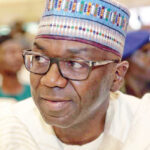
Officials from the African Union and the Food and Agricultural Organisation who were in Abuja recently to access the implementation of the Nigerian component of the Great Green Wall have commended the country for the great work done so far.
The Great Green Wall programme is an initiative of the Heads of Government of the African Union conceived in 2005 by President Olusegun Obasanjo of Nigeria, and Abdoulaye Wade of Senegal. It was adopted and developed by the African Union to address the detrimental social, economic and environmental impacts of land degradation and desertification in the Sahel and the Sahara.
The Great Green Wall is a planned project to plant a wall of trees across Africa at the southern edge of the Sahara desert as a means to prevent desertification and the project is to be coordinated by the African Union Commission.
From the initial idea of a line of trees from East to West through the African desert, the vision of a Great Green Wall has evolved into that of a mosaic of interventions addressing the challenges facing the people in the Sahel and the Sahara (sustainable land and water management).
As a programming tool for rural development, the overall goal of this sub-regional partnership is to strengthen the resilience of the region’s people and natural systems with sound ecosystem management, the protection of rural heritage, and the improvement of the living conditions of the local population.
Mr. Elvis Paul Tamgem, Coordinator of the Great Green Wall programme at the African Union Commission who was in Nigeria to assess the programme said that the delegation was impressed with the strides recorded by Nigeria in the GGW implementation.
“We are encouraged by the passing of the law creating the National Agency for the GreatGreen Wall and the kind of support the programme is getting from the Federal Government,” Tamgem said.
According to him, the GGW programme remained a flagship programme of the AU and what Nigeria is doing is one of the best that any participating countries has done so far.
“The GGW is targeted at addressing one of the challenges confronting over 40 to 50 per cent of Nigeria’s dryland. The programme in Nigeria has better and greater prospect and it will create jobs, improve livelihood and bring about socio-economic development,” he added.
He called for synergy among various organisations dealing with desertification, adding that: “Land degradation and desertification is a big challenge in Africa that only one organisation cannot handle.”
Mr. Francois Tapsoba, FAO Regional Technical Advisor for the GGW said that the Great Green Wall Initiative was a global answer to the combined effect of natural resources degradation and drought in rural areas.
According to Tapsoba, the FAO was deeply concerned with the issue of the soaring food prices and is actively engaged in seeking a long-term solution to the problem. For the Sahel and Sahara zones of Africa, where crop production is low due principally to low rainfall and low soil fertility, and general land degradation, the GGW and related interventions provide an opportunity for the inhabitants to create alternative sources of income.
He said that the FAO supported the development of a national action plan for GGW implementation in Nigeria and that so far the organisation is impressed with the way the programme is going in Nigeria.
He said that FAO partnership with the European Union on GGW has been able to get a £15 million to assist in the implementation of the programme in 6 countries, one of which is Nigeria.
“The GGW project is a great one and will attract a lot of international support and assistance but donors are eagerly waiting to see how it evolves before making commitment,” he said.
An FAO concept note on the GGW stated that Africa is a continent seriously affected by the phenomena of land degradation and desertification which has had significant negative social, economic and environmental impacts on its people. The increasing number of communities and countries that continue to suffer the negative impacts of land degradation and desertification is clearly a source of grave concern.
Population explosion coupled with the current climate change phenomena are negating the efforts of governments and development partners to improve livelihood systems in the Sahara and Sahel, which are heavily reliant on the already degraded soils, water and vegetation resources.
 Join Daily Trust WhatsApp Community For Quick Access To News and Happenings Around You.
Join Daily Trust WhatsApp Community For Quick Access To News and Happenings Around You.


